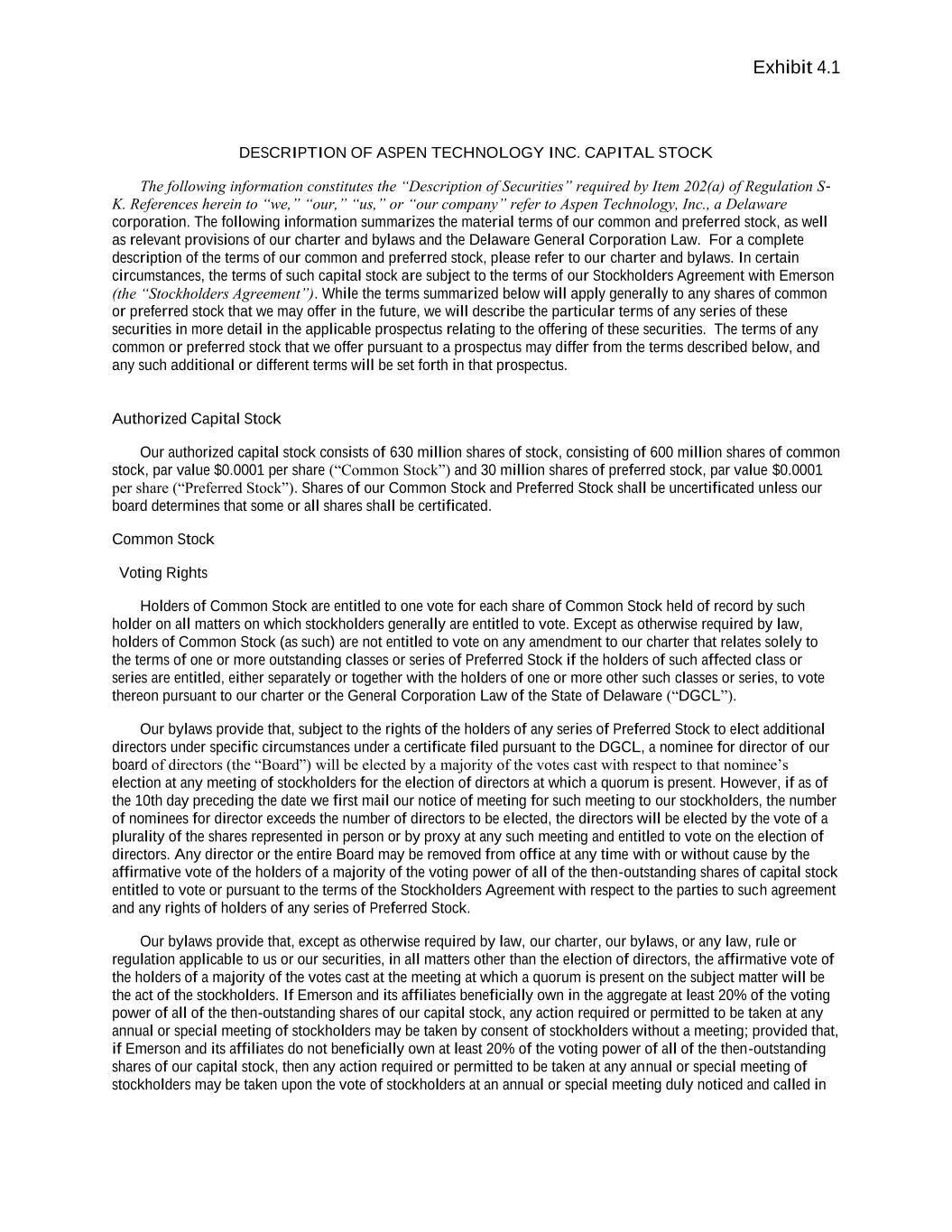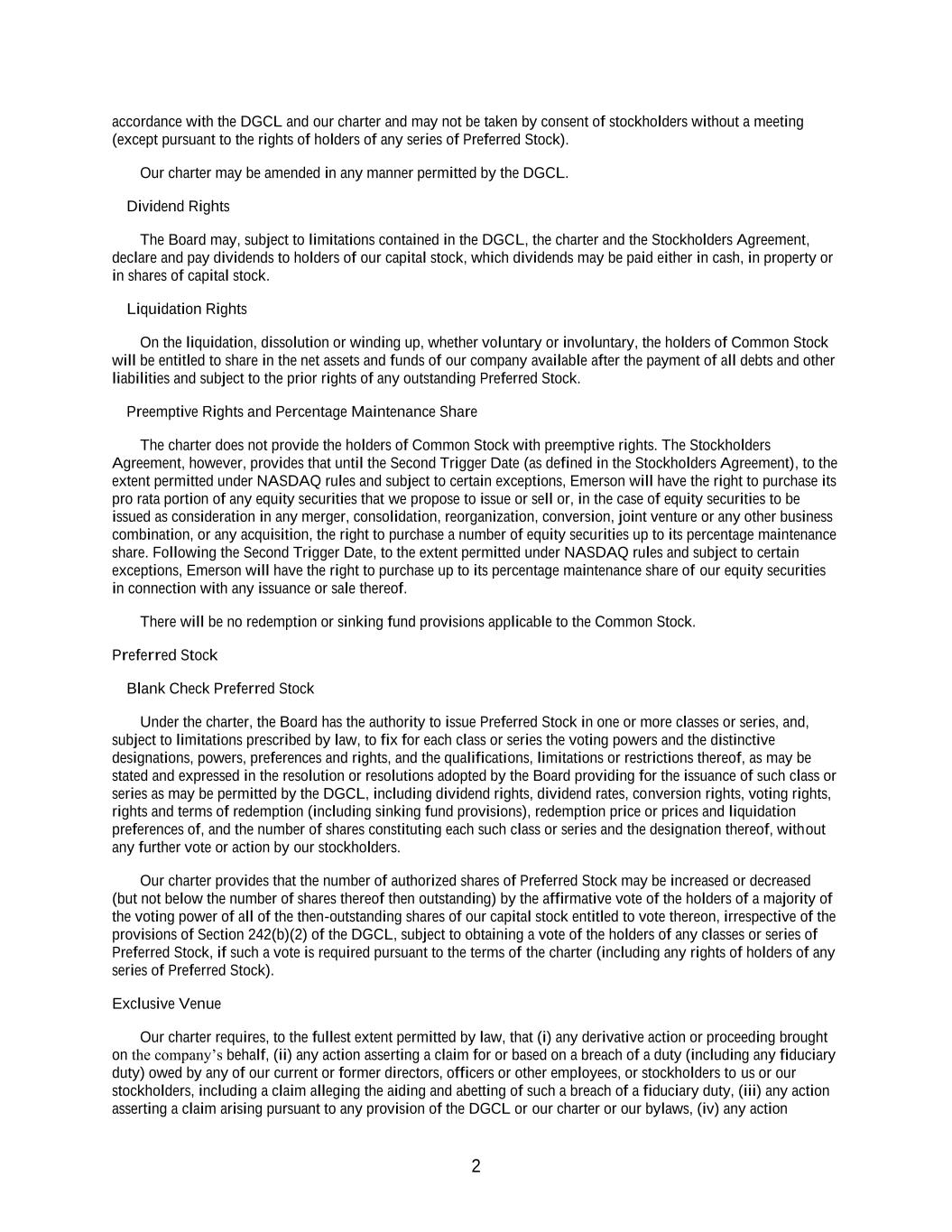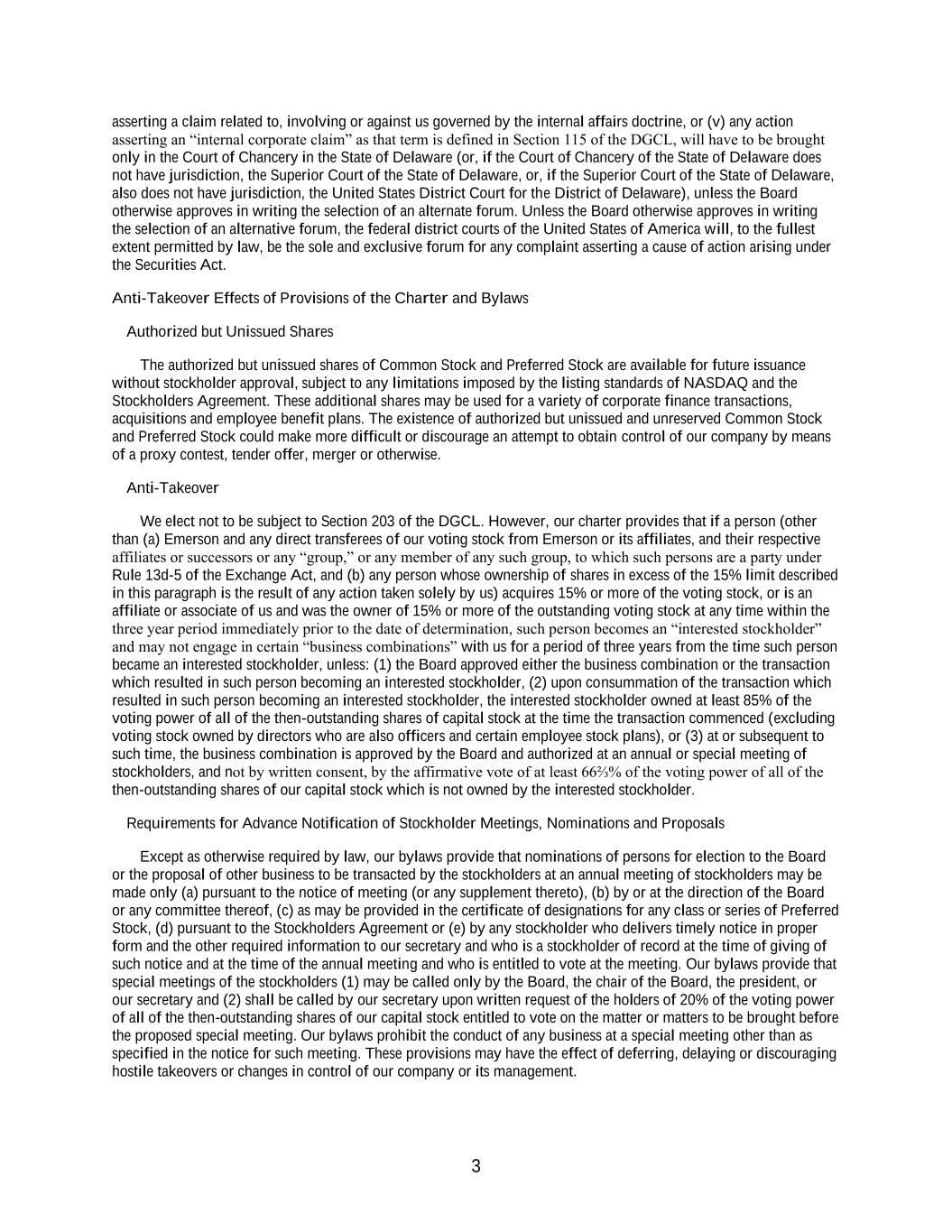
Exhibit 4.1 DESCRIPTION OF ASPEN TECHNOLOGY INC. CAPITAL STOCK The following information constitutes the “Description of Securities” required by Item 202(a) of Regulation S- K. References herein to “we,” “our,” “us,” or “our company” refer to Aspen Technology, Inc., a Delaware corporation. The following information summarizes the material terms of our common and preferred stock, as well as relevant provisions of our charter and bylaws and the Delaware General Corporation Law. For a complete description of the terms of our common and preferred stock, please refer to our charter and bylaws. In certain circumstances, the terms of such capital stock are subject to the terms of our Stockholders Agreement with Emerson (the “Stockholders Agreement”). While the terms summarized below will apply generally to any shares of common or preferred stock that we may offer in the future, we will describe the particular terms of any series of these securities in more detail in the applicable prospectus relating to the offering of these securities. The terms of any common or preferred stock that we offer pursuant to a prospectus may differ from the terms described below, and any such additional or different terms will be set forth in that prospectus. Authorized Capital Stock Our authorized capital stock consists of 630 million shares of stock, consisting of 600 million shares of common stock, par value $0.0001 per share (“Common Stock”) and 30 million shares of preferred stock, par value $0.0001 per share (“Preferred Stock”). Shares of our Common Stock and Preferred Stock shall be uncertificated unless our board determines that some or all shares shall be certificated. Common Stock Voting Rights Holders of Common Stock are entitled to one vote for each share of Common Stock held of record by such holder on all matters on which stockholders generally are entitled to vote. Except as otherwise required by law, holders of Common Stock (as such) are not entitled to vote on any amendment to our charter that relates solely to the terms of one or more outstanding classes or series of Preferred Stock if the holders of such affected class or series are entitled, either separately or together with the holders of one or more other such classes or series, to vote thereon pursuant to our charter or the General Corporation Law of the State of Delaware (“DGCL”). Our bylaws provide that, subject to the rights of the holders of any series of Preferred Stock to elect additional directors under specific circumstances under a certificate filed pursuant to the DGCL, a nominee for director of our board of directors (the “Board”) will be elected by a majority of the votes cast with respect to that nominee’s election at any meeting of stockholders for the election of directors at which a quorum is present. However, if as of the 10th day preceding the date we first mail our notice of meeting for such meeting to our stockholders, the number of nominees for director exceeds the number of directors to be elected, the directors will be elected by the vote of a plurality of the shares represented in person or by proxy at any such meeting and entitled to vote on the election of directors. Any director or the entire Board may be removed from office at any time with or without cause by the affirmative vote of the holders of a majority of the voting power of all of the then-outstanding shares of capital stock entitled to vote or pursuant to the terms of the Stockholders Agreement with respect to the parties to such agreement and any rights of holders of any series of Preferred Stock. Our bylaws provide that, except as otherwise required by law, our charter, our bylaws, or any law, rule or regulation applicable to us or our securities, in all matters other than the election of directors, the affirmative vote of the holders of a majority of the votes cast at the meeting at which a quorum is present on the subject matter will be the act of the stockholders. If Emerson and its affiliates beneficially own in the aggregate at least 20% of the voting power of all of the then-outstanding shares of our capital stock, any action required or permitted to be taken at any annual or special meeting of stockholders may be taken by consent of stockholders without a meeting; provided that, if Emerson and its affiliates do not beneficially own at least 20% of the voting power of all of the then-outstanding shares of our capital stock, then any action required or permitted to be taken at any annual or special meeting of stockholders may be taken upon the vote of stockholders at an annual or special meeting duly noticed and called in

2 accordance with the DGCL and our charter and may not be taken by consent of stockholders without a meeting (except pursuant to the rights of holders of any series of Preferred Stock). Our charter may be amended in any manner permitted by the DGCL. Dividend Rights The Board may, subject to limitations contained in the DGCL, the charter and the Stockholders Agreement, declare and pay dividends to holders of our capital stock, which dividends may be paid either in cash, in property or in shares of capital stock. Liquidation Rights On the liquidation, dissolution or winding up, whether voluntary or involuntary, the holders of Common Stock will be entitled to share in the net assets and funds of our company available after the payment of all debts and other liabilities and subject to the prior rights of any outstanding Preferred Stock. Preemptive Rights and Percentage Maintenance Share The charter does not provide the holders of Common Stock with preemptive rights. The Stockholders Agreement, however, provides that until the Second Trigger Date (as defined in the Stockholders Agreement), to the extent permitted under NASDAQ rules and subject to certain exceptions, Emerson will have the right to purchase its pro rata portion of any equity securities that we propose to issue or sell or, in the case of equity securities to be issued as consideration in any merger, consolidation, reorganization, conversion, joint venture or any other business combination, or any acquisition, the right to purchase a number of equity securities up to its percentage maintenance share. Following the Second Trigger Date, to the extent permitted under NASDAQ rules and subject to certain exceptions, Emerson will have the right to purchase up to its percentage maintenance share of our equity securities in connection with any issuance or sale thereof. There will be no redemption or sinking fund provisions applicable to the Common Stock. Preferred Stock Blank Check Preferred Stock Under the charter, the Board has the authority to issue Preferred Stock in one or more classes or series, and, subject to limitations prescribed by law, to fix for each class or series the voting powers and the distinctive designations, powers, preferences and rights, and the qualifications, limitations or restrictions thereof, as may be stated and expressed in the resolution or resolutions adopted by the Board providing for the issuance of such class or series as may be permitted by the DGCL, including dividend rights, dividend rates, conversion rights, voting rights, rights and terms of redemption (including sinking fund provisions), redemption price or prices and liquidation preferences of, and the number of shares constituting each such class or series and the designation thereof, without any further vote or action by our stockholders. Our charter provides that the number of authorized shares of Preferred Stock may be increased or decreased (but not below the number of shares thereof then outstanding) by the affirmative vote of the holders of a majority of the voting power of all of the then-outstanding shares of our capital stock entitled to vote thereon, irrespective of the provisions of Section 242(b)(2) of the DGCL, subject to obtaining a vote of the holders of any classes or series of Preferred Stock, if such a vote is required pursuant to the terms of the charter (including any rights of holders of any series of Preferred Stock). Exclusive Venue Our charter requires, to the fullest extent permitted by law, that (i) any derivative action or proceeding brought on the company’s behalf, (ii) any action asserting a claim for or based on a breach of a duty (including any fiduciary duty) owed by any of our current or former directors, officers or other employees, or stockholders to us or our stockholders, including a claim alleging the aiding and abetting of such a breach of a fiduciary duty, (iii) any action asserting a claim arising pursuant to any provision of the DGCL or our charter or our bylaws, (iv) any action

3 asserting a claim related to, involving or against us governed by the internal affairs doctrine, or (v) any action asserting an “internal corporate claim” as that term is defined in Section 115 of the DGCL, will have to be brought only in the Court of Chancery in the State of Delaware (or, if the Court of Chancery of the State of Delaware does not have jurisdiction, the Superior Court of the State of Delaware, or, if the Superior Court of the State of Delaware, also does not have jurisdiction, the United States District Court for the District of Delaware), unless the Board otherwise approves in writing the selection of an alternate forum. Unless the Board otherwise approves in writing the selection of an alternative forum, the federal district courts of the United States of America will, to the fullest extent permitted by law, be the sole and exclusive forum for any complaint asserting a cause of action arising under the Securities Act. Anti-Takeover Effects of Provisions of the Charter and Bylaws Authorized but Unissued Shares The authorized but unissued shares of Common Stock and Preferred Stock are available for future issuance without stockholder approval, subject to any limitations imposed by the listing standards of NASDAQ and the Stockholders Agreement. These additional shares may be used for a variety of corporate finance transactions, acquisitions and employee benefit plans. The existence of authorized but unissued and unreserved Common Stock and Preferred Stock could make more difficult or discourage an attempt to obtain control of our company by means of a proxy contest, tender offer, merger or otherwise. Anti-Takeover We elect not to be subject to Section 203 of the DGCL. However, our charter provides that if a person (other than (a) Emerson and any direct transferees of our voting stock from Emerson or its affiliates, and their respective affiliates or successors or any “group,” or any member of any such group, to which such persons are a party under Rule 13d-5 of the Exchange Act, and (b) any person whose ownership of shares in excess of the 15% limit described in this paragraph is the result of any action taken solely by us) acquires 15% or more of the voting stock, or is an affiliate or associate of us and was the owner of 15% or more of the outstanding voting stock at any time within the three year period immediately prior to the date of determination, such person becomes an “interested stockholder” and may not engage in certain “business combinations” with us for a period of three years from the time such person became an interested stockholder, unless: (1) the Board approved either the business combination or the transaction which resulted in such person becoming an interested stockholder, (2) upon consummation of the transaction which resulted in such person becoming an interested stockholder, the interested stockholder owned at least 85% of the voting power of all of the then-outstanding shares of capital stock at the time the transaction commenced (excluding voting stock owned by directors who are also officers and certain employee stock plans), or (3) at or subsequent to such time, the business combination is approved by the Board and authorized at an annual or special meeting of stockholders, and not by written consent, by the affirmative vote of at least 66⅔% of the voting power of all of the then-outstanding shares of our capital stock which is not owned by the interested stockholder. Requirements for Advance Notification of Stockholder Meetings, Nominations and Proposals Except as otherwise required by law, our bylaws provide that nominations of persons for election to the Board or the proposal of other business to be transacted by the stockholders at an annual meeting of stockholders may be made only (a) pursuant to the notice of meeting (or any supplement thereto), (b) by or at the direction of the Board or any committee thereof, (c) as may be provided in the certificate of designations for any class or series of Preferred Stock, (d) pursuant to the Stockholders Agreement or (e) by any stockholder who delivers timely notice in proper form and the other required information to our secretary and who is a stockholder of record at the time of giving of such notice and at the time of the annual meeting and who is entitled to vote at the meeting. Our bylaws provide that special meetings of the stockholders (1) may be called only by the Board, the chair of the Board, the president, or our secretary and (2) shall be called by our secretary upon written request of the holders of 20% of the voting power of all of the then-outstanding shares of our capital stock entitled to vote on the matter or matters to be brought before the proposed special meeting. Our bylaws prohibit the conduct of any business at a special meeting other than as specified in the notice for such meeting. These provisions may have the effect of deferring, delaying or discouraging hostile takeovers or changes in control of our company or its management.

4 Corporate Opportunities and Transactions with Controlling Stockholder In recognition and anticipation that directors, officers or employees of Emerson may serve as directors or officers of our company, that Emerson may engage in the same, similar or related lines of business as us, and that Emerson may have an interest in the same areas of corporate opportunity as us, the Stockholders Agreement provides for the allocation of certain transactions and corporate opportunities between us and Emerson. Specifically, except as otherwise agreed by us and Emerson (including in the Stockholders Agreement) and, subject to the limitations set forth in the non-compete provisions in the Stockholders Agreement, Emerson and the other members of the Emerson group will be permitted to engage in some of the same or similar activities or lines of business as us or to do business with any of our client, customer or vendor. The Stockholders Agreement provides that in the event that Emerson acquires knowledge of a potential transaction or matter that may be a corporate opportunity for both us and Emerson, Emerson shall to the fullest extent permitted by applicable law not be liable to us or our stockholders for breach of any fiduciary duty as a stockholder of us by reason of the fact that Emerson acquires or seeks such corporate opportunity for itself, directs such corporate opportunity to another person, or otherwise does not communicate information regarding such corporate opportunity to us. We to the fullest extent permitted by applicable law renounce any interest or expectancy in such business opportunity and waive any claim that such business opportunity constituted a corporate opportunity that should have been presented to us. The Stockholders Agreement provides that, except as otherwise agreed in writing between us and Emerson, in the event that a director or officer of us who is also a director, officer or employee of Emerson acquires knowledge of a potential transaction or matter that may be a corporate opportunity for both us and Emerson, such director or officer will to the fullest extent permitted by applicable law have fully satisfied and fulfilled his or her fiduciary duty with respect to such corporate opportunity. We to the fullest extent permitted by applicable law renounce any interest or expectancy in such business opportunity and waive any claim that such business opportunity constituted a corporate opportunity that should have been presented to us, if such director or officer acts in a manner consistent with the following policy: • such a corporate opportunity offered to any individual who is a director but not an officer or employee of us and who is also a director, officer or employee of Emerson will belong to us only if such opportunity is expressly offered to such person solely in his or her capacity as a director of us and otherwise will belong to Emerson; and • such a corporate opportunity offered to any individual who is an officer or employee of us and also is a director, officer or employee of Emerson will belong to us unless such opportunity is expressly offered to such person in his or her capacity as a director, officer or employee of Emerson, in which case such opportunity will belong to Emerson. Our charter provides that any person acquiring or holding any interest in any shares of our capital stock will be deemed to have notice of and consented to these provisions of the Stockholders Agreement regarding corporate opportunities. Transfer Agent and Registrar American Stock Transfer & Trust Company, LLC is the transfer agent and registrar for the Common Stock. Listing of Common Stock The Common Stock has been approved for trading and quotation on the NASDAQ stock market under the symbol “AZPN.”



